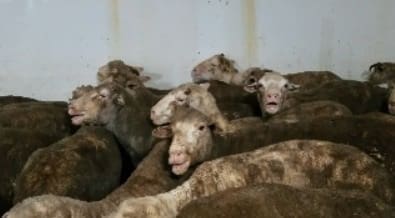
Sheep suffering heat stress on an export vessel.
ACTIVIST group Animals Australia has hit back at ‘cash for cruelty’ claims as live sheep export supporters apply pressure to the Albanese Government to review its policy to phase out the trade by sea.
In Federal Parliament recently WA Liberal MP Rick Wilson reiterated claims of “cash for cruelty” against Animals Australia, which paid whistleblowers who provided footage of sheep suffering and dying on live export vessels.
This included footage taken on the Awassi Express in 2017, when 2400 sheep perished on board in the Persian Gulf, prompting industry reform and regulation.
In Federal Parliament, Mr Wilson outlined a letter sent to Minister for Agriculture Murray Watt stating that if he continued to allow Animals Australia a privileged position in discussions with the Department of Agriculture, Fisheries and Forestry “you share their (Animal’s Australia’s) moral culpability.”
“This pattern of ethically questionable, if not illegal, activity was recently repeated with an Animals Australia activists taking covert footage of sheep in public places in Oman, an illegal activity under local law,” Mr Wilson said.
“The fact they have a special place at the table with DAFF legitimises their activities, and their attacks upon agriculture.”
Mr Watt is yet to respond to the letter from the WA politicians.
No wrongdoing here – Animals Australia
AA chief executive officer Glenys Oogjes told Sheep Central any suggestion of wrongdoing on the part of Animals Australia is denied.
“It is noteworthy that Mr Wilson has chosen to make his claims under the protection of parliamentary privilege.
“The only parties that stand rightfully accused of ‘cash for cruelty’ are the live sheep export companies – which have made hundreds of millions of dollars on the back of incalculable and egregious animal suffering,” she said.
ALEC urges review of ‘cash for cruelty’ allegations
The Australian Livestock Exporters’ Council has also called on the Federal Government to take serious action on the concerns raised by Mr Wilson and Senator Slade Brockman in Parliament in the past two weeks about the activist group. The concerns involve allegations of cash payments Animals Australia to livestock vessel crew.
ALEC chief executive officer Mark Harvey-Sutton said that the allegations were long standing, and that the controversy meant that Animals Australia should be precluded from advising the Department for Agriculture and indeed have their charitable status reviewed by the Australian Charities and Not-for-profits Commission.
“The serious claims raised in parliament point to a culture of unethical behaviour by Animals Australia.
“ALEC has always maintained that the practice of paying people in livestock export supply chains creates a market incentivising animal cruelty,” he said.
“It also demonstrates that activist groups are willing to take advantage and manipulate vulnerable people in our supply chains.
“While the Minister is right to listen to a spectrum of views from the community, he should not be taking advice from interest groups with serious allegations like these hanging over them,” he said.
“Farmers and the industry are hurting right now and seeing activist groups like Animals Australia seemingly having the inside running on agricultural policy is insulting to an industry that does more to improve animal welfare globally than these groups ever will.”
FOI lodged over payments
On Monday, Mr Rick Wilson and Senator Brockman said they had lodged a freedom of information request with DAFF, aiming to extract information about the whistleblower payments.
In February 2019, a statutory declaration was reportedly lodged with the department by Lyn White, the strategy director of activist group Animals Australia, they said in a media release.
Although Animals Australia had denied paying ship workers on board the Awassi Express, according to The Australian newspaper, the leaked statutory declaration disclosed “details of $US107,710 ($148,000) in various payments made to their key whistleblower Fazal Ullah and his family” (‘Activists hid live sheep export footage payments’, The Australian, May 5, 2022).
The two politicians said it was footage supplied by whistleblower Fazal Ullah of alleged animal cruelty that in 2018 prompted the Federal Government to shut down live exports over summer months. This prompted Labor Members of Parliament to pledge to end the live sheep export trade if they won the federal election in 2022.
Agriculture Minister Murray Watt has also declined to release a report he requested into the full details of how live sheep exports will be banned.
WA Premier Roger Cook has also urged the Federal Government reconsider its planned ban on the industry.
Mr Wilson said it has finally dawned on Mr Watt’s state Labor colleagues that banning live sheep exports would be an economic disaster for Western Australia where most of the trade occurs.
“Mr Watt now has egg on his face, having announced that live exports should and would be banned, and being contradicted by the Labor premier of a state where most of the trade occurs.
“In order to save face, Mr Watt must now abandon his anti-farming and anti-farmer plan,” he said.
Senator Brockman said it was critical that Ms White’s statutory declaration was released to the public.
“It is essential that we scrutinise the foundations upon which the Labor Government is basing its devastating decision to ban live sheep exports,” Senator Brockman said.
“Transparency is a moral imperative when policies affect countless Australian livelihoods.
“It is crucial that every piece of evidence, every testimony, and every relevant document is brought into the light.”
Mr Wilson said Mr Watt’s impending policy decision would significantly impact the nation’s livestock industry and farming communities.
“As the content of Ms White’s statutory declaration is likely to contain information pertinent to the Commonwealth’s decision, it is squarely in the public interest that the document be released without delay,” he said.
“Given that the document refers to payments to a whistle-blower whose information precipitated federal Labor’s promise to ban live sheep exports, there is a significant risk that public confidence in the Commonwealth’s impending decision on the industry’s future could be undermined unless the statutory declaration is released in full.”

HAVE YOUR SAY